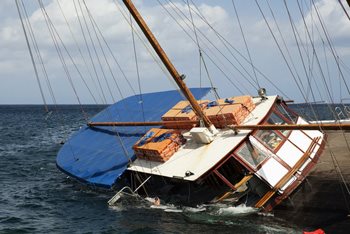Boat Accidents
A boat
accident can be classified by any accident in which one or more marine vessels
is involved. Although boat accidents share many similarities to car accidents,
such as damage and injury sustained as a result of collision(s), boat accidents
possess an added element of danger due to the presence of water. Drowning
accounts for upwards of 7,000 deaths per year. The added danger of drowning in
tandem with physical injury, in addition to property damage, allow for boat
accidents to be some of the most potentially dangerous accidents. However, with
proper training, participation in safety courses, and certification, boat
accidents can be avoided.
Types of Boat Accidents
Boat accidents vary from large, commercial vessels
to small, private boats. Furthermore, boating accidents can range from injuries
sustained on cruise ships to those sustained while participating in water
sports, such as water skiing and wakeboarding.
While boat accidents can involve both damage and
injury due to collision, the United States Civil Air Patrol unit reports that
upwards of 70 percent of boat accident fatalities result from drowning. Other
causes of boat accidents include improper and/or reckless operation.
DWI Boating Laws: Boating laws involving the
improper operation of a boat while intoxicated mirror DUI laws in their
respective place of operation. For example, in a state where the legal limit is
.08 blood alcohol content (BAC) for the operation of a motor vehicle, the same
applies for the legal operation of a boat. Furthermore, the penalties are
mirrored, as well. Depending on the severity of the boat accident, penalties for
DWI boat accidents can include fines, loss of boating licenses, and jail time.
Certifications
Boat Operator’s Certificate/Boat License: The
protocols for legal operation of boats vary from state to state. In certain
states, obtaining a boat license must be achieved through the Marine Services
Bureau, while other states require the acquisition of a boating license through
the Department of Parks and Wildlife. Every state not only maintains a standard
of legal age to operate a boat, but also a regiment of courses and examinations
to earn a boating license. Boat accidents resulting from the improper or
illegal operation of a boat can result in the loss, revocation, or suspension
of a boating license.
Boat Operators Insurance: Akin to vehicle
insurance, the operation of a boat requires the owner/operator to possess
insurance. Boating insurance not only covers the owner/operator of a boat, but
also covers damage or injury sustained by, or as a result of, that specific
owner/operator. The operation of a boat without insurance is both unlawful and
illegal.
Lifesaving Courses: As previously stated, over 70
percent of fatal boating accidents result from drowning. The completion of a
lifesaving course such a lifeguard certification and/or CPR can prevent
drowning resulting from boat accidents.
Safe Operation
Life jackets and life vests
should always be worn by every individual on the boat.
Alcohol – or any other
mind-altering substance – should never be ingested while operating a boat.
In the event of damage or
injury sustained as a result of a boat accident, individuals are encouraged to
consult with legal professionals in order to evaluate the details of their
respective cases. There exist attorneys who specialize in boat accidents.
